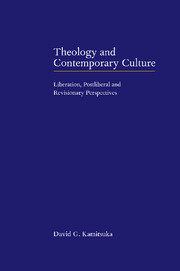Book contents
- Frontmatter
- Contents
- Acknowledgments
- Introduction
- 1 Values informing conceptions of theology
- 2 Apologetics and the linguistic-historical turn
- 3 Credibility in the pluralistic public realm
- 4 Reading the Bible theologically as the church's book
- 5 Pursuing doctrinal common ground
- 6 Virtues and vices in theological practice
- Select bibliography
- Index
2 - Apologetics and the linguistic-historical turn
Published online by Cambridge University Press: 29 September 2009
- Frontmatter
- Contents
- Acknowledgments
- Introduction
- 1 Values informing conceptions of theology
- 2 Apologetics and the linguistic-historical turn
- 3 Credibility in the pluralistic public realm
- 4 Reading the Bible theologically as the church's book
- 5 Pursuing doctrinal common ground
- 6 Virtues and vices in theological practice
- Select bibliography
- Index
Summary
One of the findings from chapter one is that theologians from revisionary, postliberal and liberation theological movements can all be construed as affirming, to varying degrees, the value of theology assessing the validity of Christian belief in a fully critical manner. Having established this formal common ground, we are now in a position to discuss how this value is instantiated methodologically in relation to apologetics or, more generally, any publicly intelligible attempt to redeem the theoretical credibility of Christian belief. My proposal on this theological task developed partly out of an attempt to untangle the especially robust intermovement polemics between revisionary and postliberal theologians on this issue. Theologians from each movement have made accusations that theologians from the other are failing to appreciate the demands of public accountability in the current intellectual climate and failing to appreciate what kind of apologetic approach is best suited to defend Christian claims in that context.
David Tracy says that he is “unpersuaded” that Lindbeck's theological method “is other than confessionalism with occasional ‘ad hoc’ apologetic skirmishes.” Tracy has even described Lindbeck as holding the view that theology should “not engage in a deliberately apologetic task at all.” Tracy implicates proponents of a cultural-linguistic theory of religion (i.e., postliberal theologians) of “abandoning” any notion of a “shared rational space,” which Tracy believes must be affirmed in order for theologians (or anyone) to redeem their claims to validity rationally and publicly. He suggests that (postliberal theologians not-withstanding) there is broad philosophical support, even from neopragmatists such as Richard Rorty, for the necessity of the notion of a “shared rationality” – at least minimally defined.
- Type
- Chapter
- Information
- Theology and Contemporary CultureLiberation, Postliberal and Revisionary Perspectives, pp. 46 - 73Publisher: Cambridge University PressPrint publication year: 1999



